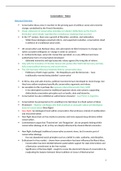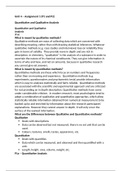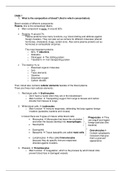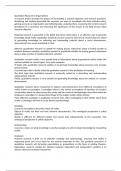Chapter 2 3rd ed 2021 overview
Economic Systems
Overview: Economic systems refer to the ownership of factors of
production and the methods used to motivate, coordinate, and direct
economic activity. The two polar extremes are the market system
(capitalism) and the command system (socialism or communism).
Market Systems:
o Characteristics: Private property, freedom of enterprise,
freedom of choice, self-interest, specialization, division of
labor, "invisible hand"
o Determines what to produce, how to produce, and who
receives the output through the price mechanism and consumer
sovereignty
o Adjusts to change and promotes progress through the process
of "creative destruction"
Command Systems:
o Characteristics: State/collective ownership of factors of
production, centralized planning and decision-making
o Declining in prevalence due to inefficiencies and lack of
incentives
Emerging Markets:
o Rapidly growing economies transitioning from traditional or
command-based systems towards more market-oriented
systems
o Examples include China, India, Brazil, and other developing
countries
Ownership of Factors of Production:
o Private property vs. state/collective ownership
Coordination and Direction of Economic Activity:
o Market mechanism (price system) vs. centralized planning and
decision-making
, Command Systems
Overview: Command systems, also known as centrally planned
economies, are economic systems where the government owns most
property resources and makes decisions through a central economic
plan and a central planning board. These systems were prevalent in
the USSR, Yugoslavia, and East Germany, but faced significant
challenges that led to their demise.
Characteristics:
o Government owns most property resources
o Central economic plan
o Central planning board makes decisions
Central Economic Plan:
o The central planning board is responsible for making decisions
on what to produce, how to produce, and who receives the
output.
Government Ownership of Property Resources:
o The government owns and controls the majority of property
resources in a command system.
Central Planning Board:
o The central planning board is the key decision-making body
that coordinates the economic activities in a command system.
Demise of Command Systems:
o The command systems in the USSR, Yugoslavia, and East
Germany faced two insurmountable problems:
Coordination Problem: Central planners had to
coordinate millions of individual decisions by consumers,
resource suppliers, and businesses, which proved to be an
immense challenge.
Expansion of Economies: As economies grew, the
complexity of the coordination problem became
increasingly difficult to manage.
Lack of Success Indicators:
o Command systems lacked reliable indicators of success,
making it difficult to assign quantitative production targets
without unintentionally producing distortions in output.
Economic Systems
Overview: Economic systems refer to the ownership of factors of
production and the methods used to motivate, coordinate, and direct
economic activity. The two polar extremes are the market system
(capitalism) and the command system (socialism or communism).
Market Systems:
o Characteristics: Private property, freedom of enterprise,
freedom of choice, self-interest, specialization, division of
labor, "invisible hand"
o Determines what to produce, how to produce, and who
receives the output through the price mechanism and consumer
sovereignty
o Adjusts to change and promotes progress through the process
of "creative destruction"
Command Systems:
o Characteristics: State/collective ownership of factors of
production, centralized planning and decision-making
o Declining in prevalence due to inefficiencies and lack of
incentives
Emerging Markets:
o Rapidly growing economies transitioning from traditional or
command-based systems towards more market-oriented
systems
o Examples include China, India, Brazil, and other developing
countries
Ownership of Factors of Production:
o Private property vs. state/collective ownership
Coordination and Direction of Economic Activity:
o Market mechanism (price system) vs. centralized planning and
decision-making
, Command Systems
Overview: Command systems, also known as centrally planned
economies, are economic systems where the government owns most
property resources and makes decisions through a central economic
plan and a central planning board. These systems were prevalent in
the USSR, Yugoslavia, and East Germany, but faced significant
challenges that led to their demise.
Characteristics:
o Government owns most property resources
o Central economic plan
o Central planning board makes decisions
Central Economic Plan:
o The central planning board is responsible for making decisions
on what to produce, how to produce, and who receives the
output.
Government Ownership of Property Resources:
o The government owns and controls the majority of property
resources in a command system.
Central Planning Board:
o The central planning board is the key decision-making body
that coordinates the economic activities in a command system.
Demise of Command Systems:
o The command systems in the USSR, Yugoslavia, and East
Germany faced two insurmountable problems:
Coordination Problem: Central planners had to
coordinate millions of individual decisions by consumers,
resource suppliers, and businesses, which proved to be an
immense challenge.
Expansion of Economies: As economies grew, the
complexity of the coordination problem became
increasingly difficult to manage.
Lack of Success Indicators:
o Command systems lacked reliable indicators of success,
making it difficult to assign quantitative production targets
without unintentionally producing distortions in output.










